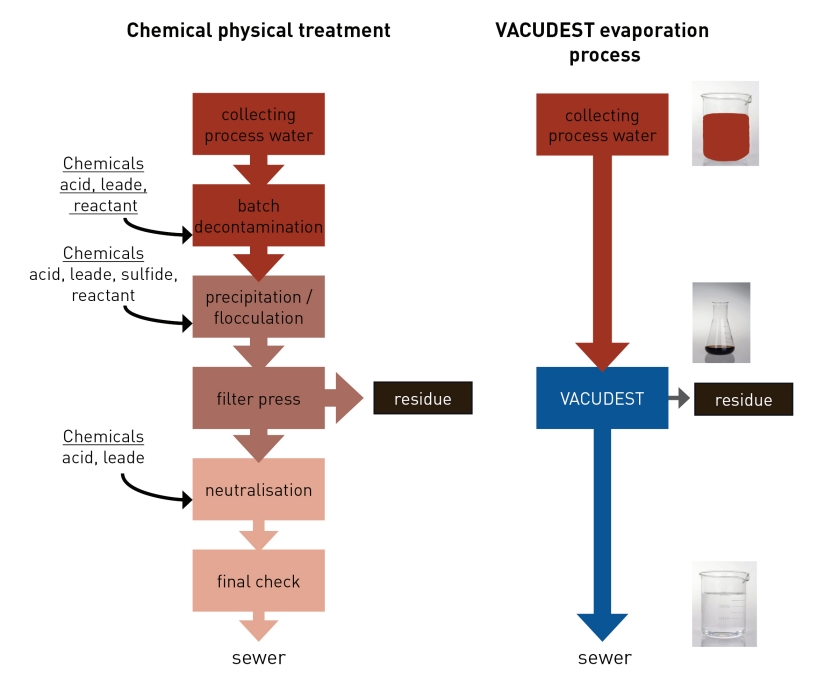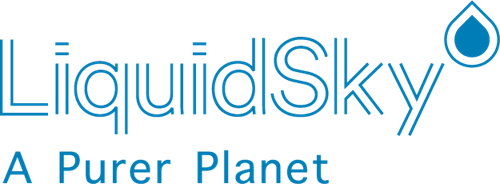Evaporation stills fear of chelates and heavy metals

Evaporation stills fear of chelates and heavy metals
Zinc nickel plating is the state of the art corrosion protection method for stainless steel. In the automotive industry as well as in the mining and in the production of windmills it replaces old processes like alkaline zinc plating for instance. The electrolytes used in zinc nickelplating contain highly concentrated chelating agents. This makes treatment of such industrial wastewater conventional chemical physical treatment systems very difficult.

As an alternative to this oxidation and precipitation treatment evaporation has proofed to be able to separate heavy metals and chelating agents reliably. This eases treatment of waste water from zinc nickel plating. The treated water can be recycled as process water to several process steps, creating a zero liquid discharge production. Difficult treatment of wastewater containing chelating agents or cyanides.
The treatment of zinc nickel plating waste water using conventional chemical physical methods in high chemicals consumption and work load for operators. Precipitation of heavy metals is very difficult. Precipitation using sulfides frees chelating agents These free chelating agents immediately bind other metals. Thus limits regarding heavy metal concentrations are difficult to meet.
Depending on the anolyt system applied chelating agents free cyanides when being decomposed. Chelating agents as well as cyanides can be decomposed by oxidation, and filtration; however this process step increases cost because of chemical and additional operator work load and reduces process reliability.
Low investment cost – high operation cost
Investment costs for conventional zinc nickel plating wastewater treatment system are rather low. High chemicals consumption and high operator work load result in high operation cost, especially if the wastewater composition varies. In addition authorities require reporting regarding compliance with disposal limits.
Modern process: vacuum evaporation
An alternative is thermal treatment of the zinc nickel wastewater. Vacuum evaporation relies the principle of difference in boiling points. When evaporating industrial wastewater substances having higher boiling points than water (oil, fat, heavy metal salts) remain in the evaporation residue, like for instance lime and salts precipitate in a tea pot which has been forgotten on the oven. Industrial waste water from zinc nickel plating is evaporated under vacuum of about 650 mbar at a temperature of about 86 °C. The emerging steam, free of heavy metals and salts, is compressed in a roots pump to atmospheric pressure. During compression the steam is heated to about 120 °C. This super-heated steam is then used to provide energy to the evaporation process.
No costs for iron salts, milk of lime, flocculation agents and other chemicals Costs for chemical consumption are lower. Less manual work to operate the vacuum evaporation system Maintenance and operation work load is by about 70 % lower. Lower costs for the treatment of municipal fresh water to ensure quality requirements to the rinsing water in the zinc process Treated water from evaporation can be recycled to the process creating a zero liquid discharge production
Compared to atmospherical evaporation this energy recycling energy consumption by 95 % Compared to pump evaporation systems this energy recycling
reduces consumption by 60%. The treated water can be reused as process water in the plating process. It can replace demineralized municipal water. To ensure quality requirements polishing using on exchanger might be necessary. This would definitely ensure conductivity below 10 µS/cm. Certainly the treated water can be disposed of into the public sewer system as well.
Comply with legal limits despite chelating agents!
It is a horror for every production manager. Surprisingly authorities check compliance with legal limits and proofs that nickel limits have been markedly exceeded. It has passed through the wastewater treatment because it is by chelating agents. This immediately creates trouble and high workload.
Industrial wastewater treatment is not production related, thus no one really wants to take care of it. Treatment of such waste water is an non profit area which has to work reliably without putting too much effort into it.
Due to being a physical process vacuum evaporation gains points against conventional chemical physical treatment methods regarding process reliability. Heavy metals and salts are separated reliably. There is no risk to allow heavy metals to stay in the water due to using a wrong flocculating agent or due to adjusting the pH to a wrong value. If even the treated water is recycled a zero liquid discharge production is created and no disposal limits have to be kept any more.
Operation cost: Chemicals or energy?
No matter which process is used, vacuum evaporation or chemical physical treatment, operation costs cannot be prevented. Main part of the operation cot of modern vacuum evaporation systems are the electricity costs. Many people regard this technology as being a energy guzzler. This might be true for conventional systems. Modern vacuum distillation systems use 35 to 70 kWh/ m³ of wastewater, depending on capacity. Certainly this is still more than the energy consumption of conventional precipitation and flocculation technology, but there are other factors reducing operation costs drastically.
Operation experience at Compte Galvanotechnik
The meduim sized company, founded in 1836 in Sulingen, Northern Germany, today is a well respected coating specialist to the automotive and machine building industry. In the existing waste water treatment system it was not possible to treat waste water from zinc nickel plating, since compliance with legal limits could not be achieved.
Mr. Hölzchen, environmental manager of Compte Galvanotechnik, studied several different possibilities to treat this water ensuring process reliability. In the Application center of H2O GmbH it could be proofed that vacuum evaporation system fulfills these requirements. Results regarding operation cost, evaporation rate and quality of treated water convinced Compte Galvanotechnik to invest in VACUDEST from H2O in 2011. Mr. Hölzchen ensures that today the treatment systems works reliably and complies with all Compte Galvanotechenik requirements.
The lowest investment costs are not of biggest importance, optimized operation costs ensure tomorrows earnings!
Decision in favor of an industrial waste water treatment system is not an easy task. Many different factors have to be looked at very carefully. But even in times of tight budgets one can proof that low investment cost is not the most important factor. Operation cost, operation work load and independence from compliance with legal limits have bigger impact on the life cycle cost of a treatment system for industrial wastewater.
